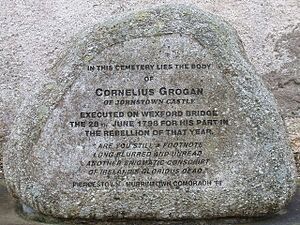Cornelius Grogan facts for kids
Cornelius Grogan (born around 1738, died 1798) was an important figure during the Irish Rebellion of 1798. He was known as a United Irishman and served as a commissary-general (meaning he was in charge of supplies) for the rebel army in Wexford.
Contents
The Story of Cornelius Grogan
Early Life and Family
Cornelius Grogan was born around 1738. He was the oldest son of John Grogan, who owned a large estate called Johnstown Castle in Wexford. His mother, Catherine, came from a well-known Scottish family.
His father was a Protestant and a member of the Parliament of Ireland. This was the main law-making body in Ireland at the time. Cornelius took over the family estates when he grew up. He was also chosen as the High Sheriff of Wexford in 1779. From 1768 to 1776, he was a Member of Parliament (M.P.) for Enniscorthy, just like his father had been.
Cornelius was well-liked by the people who lived on his land. However, in his later years, he was often unwell and did not leave his home much. He never married.
Role in the Rebellion
In 1798, a big uprising called the Irish Rebellion of 1798 began. Cornelius Grogan joined the rebels. It was later debated whether he joined willingly or was forced to. He became the commissary-general for their army, meaning he was responsible for getting food and supplies for the soldiers.
Trial and Execution
When the government forces took back Wexford, Cornelius Grogan was put on trial by a court-martial. This is a special court run by the military.
He argued that he had been forced to take part and had not actually done anything against the government. However, his plea was not accepted. He was executed on Wexford bridge on June 28, 1798. Two other landlords from Wexford, John Henry Colclough and Bagenal Beauchamp Harvey, who had also joined the rebels, were executed with him. Harvey always said that Grogan was innocent.
After his death, Cornelius Grogan's family lands were taken by the Crown (the government). But his youngest brother, John Knox, was able to get them back after paying a large fine.
See also
- Wexford Rebellion of 1798
- Bagenal Harvey, John Henry Colclough, Matthew Keogh, Philip Roche, John Kelly of Killanne - Rebel leaders executed on Wexford bridge in June 1798
 | John T. Biggers |
 | Thomas Blackshear |
 | Mark Bradford |
 | Beverly Buchanan |


